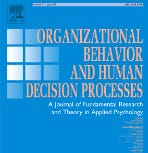New article in OBHDP (August 28th, 2024)
When expressing pride makes people seem less competent
https://www.sciencedirect.com/science/article/abs/pii/S074959782400044X
Rebecca L. Schaumberg
We tend to take great satisfaction in our professional and personal accomplishments, and often want to share that pride with others. Prior research has indicated that when a person shares these pride-inducing accomplishments, others generally think more highly of that person’s competence. This past work, however, has examined these expressions of pride without considering whether others in that environment—such as work colleagues—tend to share their own successes. For example, you may work in a team where people are quick to advertise their “wins,” or you may work with teammates who keep those victories to themselves. In this article, the author argues that colleagues may react quite differently to pride expressions in these two different scenarios. She proposes that expressing pride in one’s performance signals lower competence when others in the group do not have a prideful reaction to their own successes. Across nine preregistered studies, her results showed that expressing pride in one’s performance signals to others that the performance is close to that person’s peak ability. In other words, colleagues may assume a person expresses pride because it is “the best they can do.” In the author’s experiments, these assumptions about the person’s “maxed out” performance potential helped explain why expressing pride led others to perceive the person had lower competence. Taken together, this research provides valuable advice to employees who experience professional and personal accomplishments. When deciding whether to express pride in those accomplishments, employees may benefit from first considering whether their colleagues also tend to share their wins.
P.S. if you can’t access the full-text let us (m-kouchaki@kellogg.northwestern.edu or mikebaer@asu.edu) know and we’d be happy to share a copy.


